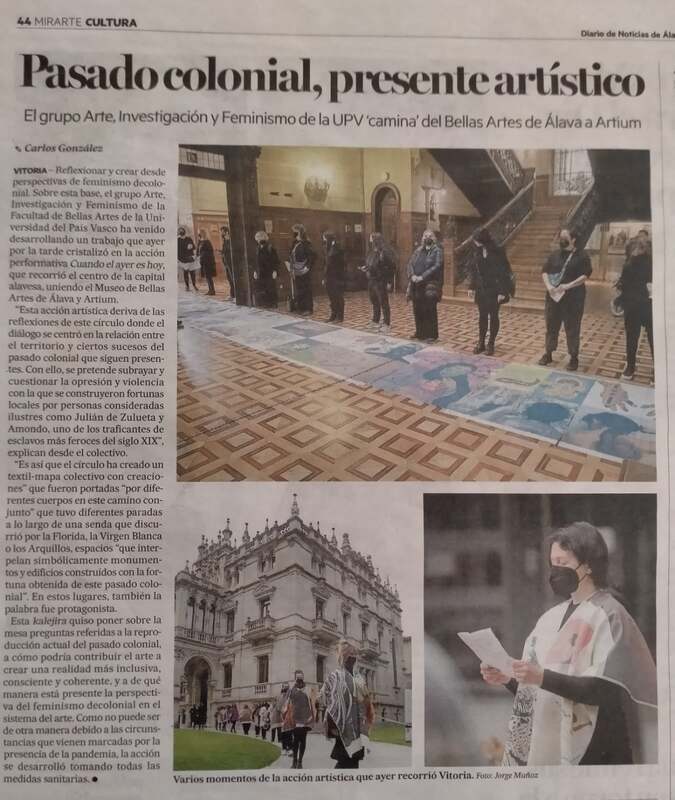|
El pasado martes tuvo lugar la acción colectiva Cuando el ayer es hoy, en la cual he tenido el placer de ser co-creadora siendo integrante del grupo de investigación Arte, Investigación y feminismos de la Universidad del País Vasco. Agradecer enormemente a todas las personas integrantes del grupo de investigación, agradecer a cada una, entre ellas Nieves Larroy, Izaskun Alonso Saratxaga, Gladys Giraldo, Txaro Arrazola y todas las demás, cada persona que ha contribuido a hacer de ese proceso de aprendizaje un pequeño pasito a avanzar en este tan importante y necesario debate transversal al presente. Agradecer también al fabuloso apoyo logístico en Vitoria entre ellos Aitor Sánchez Smith y Lorna Biermann además de cada persona que estuvo presente en el caminar de la acción en Vitoria, quienes estuvieron presentes en todo su recorrido y quienes aparecieron brevemente. Aquí un artículo sobre la acción en el Diario de Álava: https://www.noticiasdealava.eus/cultura/2021/04/14/pasado-colonial-presente-artistico/1092163.html **English translation below Last Tuesday the collective action "When yesterday is today" took place, in which I have had the pleasure of being co-creator as a member of the research group Art, Research and Feminisms of the University of the Basque Country. Thank you enormously to all the people of the research group, to thank each one, including Nieves Larroy, Izaskun Alonso Saratxaga, Gladys Giraldo, Txaro Arrazola and all the others, each person who has contributed to making this learning process a small step to move forward in this so important and necessary transversal debate to the present times. Also thanks to the fabulous logistical support in Vitoria, including Aitor Sánchez Smith and Lorna Biermann, as well as each person who was present during the action in Vitoria, the ones who were present throughout its journey and the ones who appeared briefly. The following is the English translation of the article posted previously where more in depth info can be found: "Colonial past, artistic present The Art, Research and Feminisms group at UPV-EHU university walks from The Fine Arts Museum of Álava to Artium, museum of Contemporary Arts. "When yesterday is today" took place on the 13th of April 2021 by Art, Research and Feminisms research group, University of the Basque Country. More information in Spanish and Basque language can be found in the following link: https://investigacionarteyfeminismos.wordpress.com/cuando_el_ayer_es_hoy/ The following information is an English translation of the article "Colonial past, Artistic present" published as response to the collective action by Diario de Álava. The article describes the aims and objectives of this process briefly. https://www.noticiasdealava.eus/cultura/2021/04/14/pasado-colonial-presente-artistico/1092163.html Reflect and create from decolonial feminism approaches. On this basis, the group Art, Research and Feminism of the Faculty of Fine Arts at the University of the Basque Country has been developing a work that yesterday afternoon crystallized in the performative action When yesterday is today, which took place in the center of Vitoria, connecting the Fine Arts Museum of Álava and Artium. "This artistic action derives from the reflections of a women's circle emerging from the research group. The dialogue focused on the relationship between the local territory and some colonial past events that are still present. With this, the aim is to highlight and question the oppression and violence with which fortunes were built by people considered illustrious. People including Julián de Zulueta and Amondo, one of the most ferocious slave traders of the 19th century. For this action, the group has created a collective textile-map with visual creations that were carried by various bodies on this joint path. The journey had different stops along and passed through out the areas the Florida, the Virgen Blanca and Los Arquillos. These places contain public sculptures and buildings built with the fortune obtained from this colonial past. This kalejira aimed to raise questions about the current reproduction of the colonial past. How art can contribute to creating a more inclusive, conscious and coherent reality? how the perspective of decolonial feminism is present in the art system? Due to the circumstances marked by the pandemic, the action was developed with all the sanitary measures."
0 Comments
Leave a Reply. |
|
